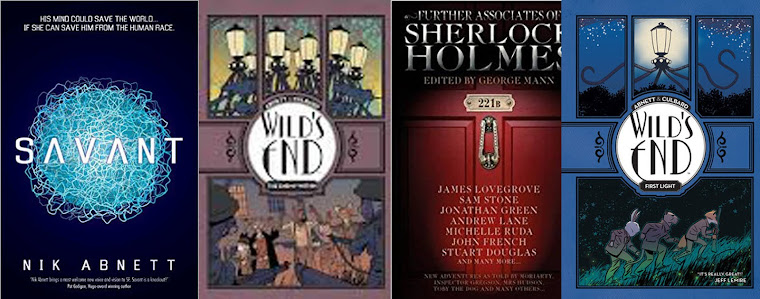We tell stories for any number of different reasons.
Fairy stories are quite a special case in point. Children know that the bogie man exists in all his wonderful variations. Children know about monsters. We tell fairy stories to reassure children that heroes exist too, to let them know that the monsters can be overcome, that they can be beaten. We are born to fear. There is sufficient of the primal instinct remaining in us to respond to things we don’t understand. Because we are intelligent beings, we have learned coping strategies. Because we are blessed with imagination, some of those coping strategies come with the added pleasure of entertainment.
Just look how extraordinary the human mind can be.
Albert Einstein said, "If you want your children to be intelligent, read them fairy tales. If you want them to be more intelligent, read them more fairy tales."
I’m pretty sure we’re in universal agreement that Einstein was a genius.
I’m not sure the same thing can be said of Richard Dawkins.
 |
| Richard Dawkins on Fairy Tales |
Mr Dawkins was in the news, yesterday talking about Santa Claus and Fairy Tales. He questioned whether it was a good idea to go along with childhood fantasies. He also said, “I think it's rather pernicious to inculcate into a child a view of the world which includes supernaturalism”. He called for scepticism and for scientific rigor from a young age.
I’m afraid I rather disagree with Richard Dawkins... For several reasons.
Firstly, the World of the imagination is a wonderful thing. I can’t help thinking that the best and greatest scientist throughout history employed their imaginations in all kinds of inventive ways to come up with their hypotheses. They had first to be able to imagine how things might be, how they might work to be able to come up with theories to test and methods of testing them. “I wonder how?” and “What if?” surely are questions that the scientist asks as often as does the artist.
On the subject of Santa Claus: That moment of realisation, that rite of passage, that loss of innocence when a child realises that Santa Claus isn’t real is key to a child’s life, to growing up, to becoming something new. Why would Richard Dawkins want to deprive a child of that moment and the many moments like it that are part of a person’s development. How many adults does he think grow up to believe in Santa Claus?
You see, I don’t think that Santa Claus or Fairy Tales are Richard Dawkins’s problem. Dawkins has an agenda. When he’s talking about the ‘supernatural’, he’s actually referring to God. Richard Dawkins is an atheist. He is a loud and proud atheist. He has built a career out of being an atheist. What’s more, and this is key, Richard Dawkins is an evangelical atheist. He is almost as evangelical as some of our favourite religious types, because Richard Dawkins believes very strongly that we should all be atheists and it appears to be his life’s work to persuade us all to give up God and turn to his religion: atheism. For my money, that makes him no better than any other zealot.
If we take fairy tales away from our children, we take away part of our culture and part of theirs. It’s foolish. It’s as foolish as taking science out of schools. I think we should give our children as much science and as much culture, and as much of everything good as we can possibly give them.
In the science lab, let’s be rigorous. In the English lesson, let’s be critical. Let’s sit with our kids when they’re watching a movie, and let’s talk to them about the content. Let’s discuss current affairs, let’s laugh at the latest jokes and sing along to the latest cheesy pop song.
The point is, we shouldn’t be depriving our children of anything. They’re people, too, and with a little guidance and a little love and some good sense parenting, they’ll be curious about everything and they’ll grow into questioning, responsible people.
Mr Dawkins could learn a good deal from a well brought up, intelligent, creative ten year old with a healthy imagination. I’m less sure that the child could learn very much from him.

I share your views on Mr Dawkins. Having been 'preached' at by his 'followers' to take on board the 'truth' of his views I hit the realisation that his brand of atheism might as well be a religion of its own. But I digress...
ReplyDeleteImagination is one of the most precious resources our species has, and it's lived (ok, not always happily) alongside more pragmatic thought this far. Taken to its extreme, his agenda leaves a world that's efficient and progressive, and devoid of ideological conflict... But also devoid of art, stories, and all the things that make life the enjoyable journey it is.
When I look up at a cloud, I want to see a dinosaur, or a spaceship, or a cake. I'm not that bothered about seeing a mass of evaporated water.
Attacking art is censorship.
ReplyDeleteBut then Dawkins' desires have always had more in common with extreme religionists of any creed than actual rationalists.
Btw it's Professor Dawkins. He is the world's leading evolutionary biologist and all he's trying to do is stop you all from falling for the deeply unethical bullshit pedalled by a bunch of misogynistic god botherers. But you know what? You are all too small minded to understand that. So keep the paedos and warmongers as your leaders and follow them blindly and unquestioningly. You deserve them.
ReplyDelete